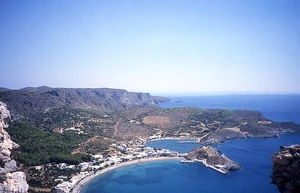
Cythere, aka Cythera or Kythira, is one of the Greek islands. It is mentioned three times by Stevens:
- "The opposite of Cythere, an isolation" ("An Ordinary Evening in New Haven" xxi.10).
- "The Cytherean glade" ("Carnet du Voyage" vi.2).
- "From Cytherea and its learned doves" ("From the Journal of Crispin" II.56)
The Island Kythira[]
As Wikipedia has it: "Since ancient times, until the mid 19th century, Kythira had been a crossroads of merchants, sailors, and conquerors. As such, it has had a long and varied history and has been influenced by many civilisations and cultures. This is reflected in its architecture (a blend of traditional, Aegean and Venetian elements), as well as the traditions and customs, influenced by centuries of coexistence of the Greek, Venetian, Ottoman and British civilisations as well as its numerous visitors" ("Kythira").
Wikipedia also notes that, in Classical mythology, the island is associated with Aphrodite, the godess of love ("Kythira").
What is Cythere/Kythira Doing in Stevens?[]
In "Carnet du Voyage," the Cytherean glade takes on an utopic cast, symbolizing the accomplishments of civilization. It may also, in this regard, be understood as something of a prelapsarian image, in tha

t it signifies a civilization that function in harmony with life: "Man from the waste evolved the Cytherean glade..../ The isle revealed his worth./ It was a place to sing in/ And honor noble life" (vi.1-8).
Elsewhere, the island serves much the same function, though it should be said that, when the island appears in "An Ordinary Evening," it is also used, presumably by dint of its worldliness and long association with the developments of Western culture, as a foil for another island, unnamed, which signifies nature in and as itself. Thus Stevens uses Cythre as one of the terms in his habitual return to the oppositional relationship between the noumenal and phenomenal worlds.